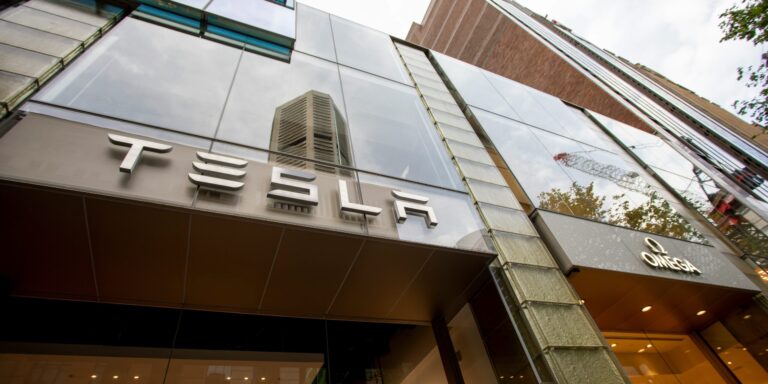U.S. markets opened Friday with two major developments in the technology sector, underscoring both the explosive growth of artificial intelligence infrastructure and the evolving debate over executive compensation in the electric vehicle industry. Broadcom, the semiconductor powerhouse, posted a dramatic pre-market surge of roughly 10 percent after announcing record-breaking AI chip sales. Meanwhile, Tesla revealed a bold new proposal for a performance-based compensation package for CEO Elon Musk, one that could potentially expand both his stake in the company and his influence over shareholder decisions.
Broadcom’s surge was fueled by surging demand for its advanced chips, which have become integral to training and running large-scale artificial intelligence models. The company disclosed that it had secured a significant new client, widely reported to be OpenAI, which has dramatically expanded its compute requirements amid the intensifying AI arms race. That partnership, along with growing orders from existing customers in cloud computing and enterprise AI, pushed Broadcom’s quarterly revenue and earnings above Wall Street expectations. Investors reacted swiftly, driving shares higher in pre-market trading and setting the stage for what analysts predict will be another record quarter for the chipmaker.
The company’s bullish guidance amplified the optimism. Broadcom forecasted AI-related semiconductor revenue to rise to $6.2 billion in the current quarter, which would mark its eleventh consecutive quarter of growth. Industry analysts say this consistency reflects both the maturity of Broadcom’s supply chain and the insatiable demand for chips powering generative AI systems, data centers, and enterprise cloud platforms. The sustained growth has positioned Broadcom as a central player in the global AI infrastructure boom, standing alongside rivals such as Nvidia, AMD, and Intel, all of which are competing to capture market share in the multibillion-dollar race to fuel artificial intelligence development.
The broader market implications of Broadcom’s announcement are significant. Investors have been closely tracking which companies stand to benefit most from the AI revolution, and chipmakers have consistently emerged as the strongest early beneficiaries. With AI deployment still in its early stages, particularly outside of major tech firms, analysts argue that the market for AI semiconductors is likely to expand for years. The resilience of demand through multiple quarters suggests that chipmakers are not only serving experimental AI projects but also supporting production-level systems that underpin commercial and consumer-facing applications.
While Broadcom was setting records in hardware, Tesla made headlines in the governance and leadership arena. The electric vehicle manufacturer disclosed that it has submitted a proposal for its November shareholder vote seeking approval for a new compensation package for Elon Musk. Unlike conventional executive pay plans that rely heavily on cash or fixed equity grants, Tesla’s plan is structured entirely around performance-based milestones. If adopted, the package would award Musk up to 12 percent ownership of Tesla through equity tranches that vest only when the company achieves specific production goals and adjusted EBITDA targets.
The proposal goes further than financial performance alone. Embedded within the plan is a mechanism that would enhance Musk’s voting power, consolidating his influence over the company’s strategic direction. Tesla’s board described the package as a way to align the CEO’s incentives with shareholder value, rewarding him only if the company sustains its growth trajectory and operational execution. The structure mirrors, in spirit, Musk’s previous landmark compensation plan from 2018, which was tied to Tesla’s market capitalization milestones and became one of the largest CEO pay packages in corporate history.
Reaction to the proposal has been mixed. Supporters argue that Musk’s leadership remains central to Tesla’s identity and competitive edge, particularly as the company expands into new markets such as autonomous driving, robotics, and energy storage. They note that tying his compensation to ambitious performance metrics ensures that his financial rewards are closely linked to the company’s success. Critics, however, caution that granting Musk additional voting power could further entrench his influence, reducing shareholder oversight at a time when corporate governance is under heightened scrutiny across the technology sector.
The juxtaposition of these two stories—Broadcom’s soaring chip sales and Tesla’s unconventional pay proposal—illustrates broader themes shaping the U.S. market in 2025. On one hand, the rapid expansion of AI infrastructure continues to redefine technology investment, with semiconductor firms at the center of global economic momentum. On the other, corporate governance debates are evolving as high-growth companies explore new ways to incentivize and retain visionary leaders while balancing shareholder interests.
For investors, the message is clear. The AI boom is not slowing, and companies positioned at the hardware core of the industry are likely to see continued growth. At the same time, shareholders in companies like Tesla face critical decisions about how much influence to entrust to high-profile executives in exchange for the promise of innovation and long-term value creation.
As markets absorb both developments, Friday’s headlines underscore the dual nature of today’s tech economy: one driven by technological infrastructure breakthroughs, and another shaped by the evolving structures of corporate leadership and compensation in a rapidly changing business landscape.
Would you like me to also prepare a shorter investor briefing version of this article—something concise and focused on key financial takeaways for traders and analysts?


